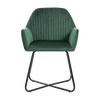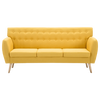The power of tools
In the vast tapestry of human civilisation, tools have played an important role in shaping our progress and development. From the simplest hand-crafted implements of ancient times to the sophisticated machines of the modern era, tools have been indispensable companions in the hands of both DIY enthusiasts and professionals alike. The diversity and effectiveness of tools have revolutionised the way tasks are accomplished, making the completion of complex projects feasible and efficient. Whether you're a DIY handyman embarking on a weekend project or a professional tackling monumental undertakings, having a wide selection of tools in your toolbox can make all the difference.
Tools: Must-haves for DIY handymen and professionals
For the DIY handyman, the toolbox becomes a personal realm of creativity and resourcefulness. Armed with an assortment of tools, DIY enthusiasts can breathe life into their home improvement dreams, from renovating living spaces to crafting bespoke furniture. Having a diverse range of tools at their disposal empowers the DIY enthusiast to delve into various projects, confident in their ability to handle a multitude of tasks and challenges. With each new addition to their toolbox, the possibilities expand and the satisfaction of accomplishing projects with their own hands becomes all the more rewarding.
For the professional, the toolbox represents a manifestation of expertise and competence. Every tool within it is carefully selected to address specific needs and achieve unparalleled precision. The professional's toolbox is a testament to their dedication to their craft and their desire to deliver exceptional results. Whether they are an architect, an engineer, a mechanic or an artist, the right tools in the hands of skilled professionals can elevate their work to the level of artistry, pushing the boundaries of innovation and excellence.
Having access to a varied assortment of tools instils a sense of preparedness and confidence. Knowing that the right tool is within reach to confront any challenge that arises fosters a mindset of proactivity and adaptability. In the face of unexpected obstacles or complex projects, the tool-equipped individual can approach the task with determination.
Selecting the right tools
Choosing the right tools is an important step in ensuring the success of any project, be it a DIY home improvement task or a professional undertaking. The right tools not only enhance productivity but also contribute to the quality of the final result. However, with the vast array of tools available, selecting the most suitable ones can be a daunting task. To simplify the process and make informed decisions, consider the following factors when choosing your tools:
-
Assess the project: Determine the nature and scope of the project you will be undertaking. Identify the specific tasks and challenges that the project entails. Evaluate the complexity and intricacy of the work involved.
-
Consider your experience level: Be honest about your level of experience and expertise in handling tools. Match the tools to your skill level to avoid unnecessary complications or accidents. Invest in user-friendly tools if you are a beginner, and gradually upgrade as you gain proficiency.
-
Understand your needs: Analyse the tools you already have and identify any gaps in your collection. Prioritise tools that align with your most frequent or upcoming projects. Avoid impulsive purchases and invest in tools that will have long-term utility.
-
Quality matters: Opt for high-quality tools, even if they may come with a higher price tag. Well-built tools not only last longer but also offer superior performance and safety. Research brands and read product reviews to make informed choices.
-
Ergonomics and comfort: Consider the ergonomics of the tools, especially if you anticipate prolonged use. Tools with comfortable grips and handles reduce fatigue and improve precision. Test the weight and balance of the tools to ensure they are manageable during operation.
-
Versatility is key: Choose tools that offer multiple functions or attachments, maximising their utility. Multi-purpose tools save space in your toolbox and are often cost-effective. Look for adjustable features that accommodate various project requirements.
-
Power source options: For power tools, choose between corded and cordless variants based on your needs. Corded tools offer consistent power but limited mobility, while cordless tools provide greater flexibility. Consider the availability of power outlets or the need for battery backups for cordless tools.
-
Safety considerations: Prioritise safety features, especially for tools with potentially hazardous applications. Invest in personal protective equipment such as safety glasses, gloves and ear protection. Educate yourself on proper tool usage and follow safety guidelines at all times.
-
Budget wisely: Set a budget for your tool purchases and stick to it to avoid overspending. Consider long-term value rather than solely focusing on the initial cost. If your budget is limited, prioritise essential tools and gradually expand your collection.
By considering these factors, you can make well-informed decisions when selecting the right tools for your projects. Remember, the right tools not only enhance your efficiency and precision but also instil confidence in your abilities, leading to successful outcomes and a satisfying project experience.
10 must-have tools in your toolbox
A well-equipped toolbox is the hallmark of a capable and prepared individual, be it a DIY enthusiast or a professional. With a diverse range of tasks and projects constantly on the horizon, having a selection of must-have tools is important. These essential tools not only facilitate the completion of projects but also empower individuals to tackle a wide array of challenges with confidence and precision.
From tightening screws to building furniture, the following 10 must-have tools are indispensable companions for any toolkit.
-
Screwdrivers: Screwdrivers come in various types, such as flathead and Phillips, and are essential for tasks involving screws. Whether assembling furniture, installing fixtures or disassembling appliances, screwdrivers are indispensable for most DIY projects.
-
Hammers: A hammer is a versatile tool that serves numerous purposes, including driving nails, removing nails and light demolition work. Its solid construction and simple design make it a fundamental tool for any toolbox.
-
Drill: A power drill significantly expedites drilling tasks, making it essential for creating holes in various materials, such as wood, metal or plastic. With various drill bits available, it allows for a range of hole sizes and is a must-have for any DIY enthusiast or professional
-
Pliers: Pliers offer a strong grip and are instrumental in holding, bending and cutting wires and other materials. Their utility extends to plumbing tasks, home repairs and electrical work, making them a fundamental addition to the toolbox.
-
Tape measure: Precision is important in any project, and a tape measure provides accurate measurements for cutting materials, ensuring precise placement and verifying dimensions.
-
Utility knife: A utility knife with a retractable blade is perfect for cutting materials like cardboard, carpet, plastic and more. Its versatility and ease of use make it indispensable for numerous cutting tasks.
-
Level: Achieving a straight and level surface is essential for various projects, from hanging picture frames to installing shelves. A spirit level ensures accuracy and symmetry, preventing skewed results.
-
Adjustable wrench: An adjustable wrench accommodates various nut and bolt sizes, making it a versatile tool for plumbing, automotive repairs and furniture assembly. It eliminates the need for multiple wrenches and streamlines the toolkit.
-
Safety gear: While not a tool as such, safety gear is crucial for protecting yourself during various tasks. Safety glasses shield the eyes from debris, gloves protect hands from sharp edges and ear protection guards against loud noises.
-
Combination square: A combination square excels at measuring angles and ensuring accurate 90-degree cuts. Its usefulness extends to marking lines and verifying right angles during construction and woodworking projects.
Each of these must-have tools plays an important role in various DIY projects and professional endeavours. From basic repairs to complex constructions, their collective presence in the toolbox enables individuals to approach tasks with confidence, efficiency and precision. Additionally, owning these fundamental tools serves as a foundation for expanding one's toolkit with specialised implements as needed, further enriching the potential for creative expression and problem-solving.































































